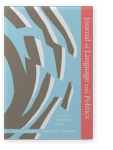Vol. 22:2 (2023) ► pp.185–203
Interpersonal-function topoi in Chinese central government’s work report (2020) as epidemic (counter-)crisis discourse
Using Systemic Functional Grammar and conceptual framework in the argumentation-oriented approach to discourse, this study analyzes Chinese central government’s “ Report on the Work of the Government” in 2020 (henceforth the Report) to explore the “interpersonal-function topoi” in the political discourse. The Report was delivered and issued against the backdrop of the surging covid-19 epidemic. This study first calculated the frequency of mood, modality and persons in the Report. The statistics were qualitatively analyzed in relation to various topoi-imagery of the crisis vis-à-vis representing the agency-reflected in the interpersonal metafunction of the language in the Report. These topoi play a vital role in winning popular support for the Chinese central government’s anti-epidemic measures and mobilizing the widest public into actions against the covid-19 pandemic. The analysis demonstrates how the analysis of interpersonal metafunction from an argumentation-oriented perspective can shed light on dealing with crisis discourse, especially in the pandemic settings.
Article outline
- 1.Introduction
- 2.Theoretical framework and methodology
- 3.Analysis of interpersonal meaning in the report
- 3.1Mood system in the report
- 3.2Modality system in the report
- 3.3Person system in the report
- 4.Interpersonal-function topoi
- 4.1Topoi in imagery of the crisis
- 4.1.1The past (weakness)-to-future (strengthening-action) topos
- 4.1.2Real-and-projected topos
- 4.2Topoi in representing agency
- 4.2.1Representing the subjects
- 4.2.2Modalizing the agency
- 4.1Topoi in imagery of the crisis
- 5.Conclusions
- Note
-
References
